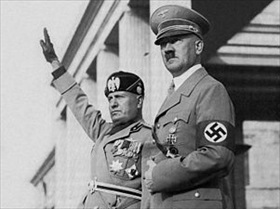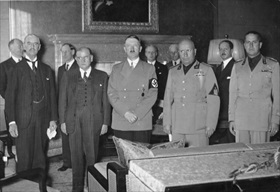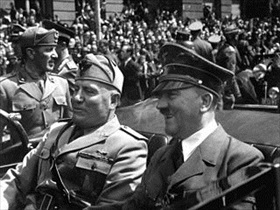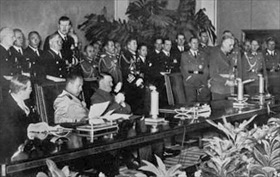MUSSOLINI DECLARES WAR ON FRANCE, BRITAIN
Rome, Italy · June 10, 1940
On March 18, 1940, at the Brenner Pass on the Italian-Austrian border, Adolf Hitler and Italian strongman Benito Mussolini met face to face. Hitler had requested the summit in order to force the Duce (Italian, “leader”) to take sides within the framework of the German-Italian Pact of Steel, signed by the foreign ministers of their respective countries the year before in Berlin. Since then Hitler had destroyed two countries, Czechoslovakia and Poland (1939), while a hesitant Mussolini watched from the sidelines, building up his armed forces and dithering over when and how he would end Italy’s “nonbelligerent status.”
The summit did not change Mussolini’s position; instead, he insisted on waiting for “mathematical certainty” before entering the war against the Western Allies. Now in April, May, and June 1940, after the Wehrmacht (German armed forces) had made short work of Denmark, Norway, Holland, Belgium, and Luxembourg, and was now making stunning incursions into France, whose government had fled its capital, the calculating Mussolini chafed at the bit to enter a war he believed would be easy and short, and would moreover allow him to add territories bordering the Mediterranean Sea to his own “Fascist Empire”; for example, Egypt where British and Commonwealth forces were outnumbered by Italian forces in the neighboring Italian colony of Libya.
On this date in 1940, Mussolini declared war on France and Britain in the name of Italy, though he had not consulted his own government or the advisory Grand Council of Fascism, and the date he had chosen to declare war had been coordinated with Hitler. Respectful of diplomatic niceties, the Duce gave his enemies six hours prior notice. The following day, on June 11, Mussolini sent the Italian Royal Air Force (Regia Aeronautica) to attack French bases in Tunisia, North Africa, and on the French Mediterranean island of Corsica, as well as British installations on the strategically located fortress island of Malta, 55 miles south of Sicily. (The Italian air campaign against Malta would last three years and end in failure.) That night the British retaliated by bombing Turin, a major business and cultural center in Northern Italy, and the first Italian city to be hit during World War II. For Italy, the nightmare years were just beginning.
[amazon_carousel widget_type=”ASINList” width=”600″ height=”200″ title=”Recommended Reading” market_place=”US” shuffle_products=”False” show_border=”False” asin=”1929631421,0275979377,0521747171,0521856027,0521747139,0340981733,041573410X,1936274299,1842126067,0700614125″ /]
Milestones on the Italy’s Road to Perdition
 |  |
Left: Mussolini coined the term “Axis Powers” when he spoke of a Rome-Berlin axis on November 1, 1936. The Rome-Berlin axis arose out of the treaty of friendship signed between Italy and Germany the week before. It was around this new axis that other states in Europe and elsewhere would revolve, he said. Later, in May 1939, this treaty of friendship was transformed into a military alliance, which Mussolini called the “Pact of Steel.”
![]()
Right: British Prime Minister Neville Chamberlain and French Premier Édouard Daladier believed appeasement to be a practical and politically correct way to deter Hitler from further roiling Europe’s political waters and plunging the continent into a second world war. On September 29, 1938, in Munich the major European heads of state agreed to the incorporation of German-speaking Czech Sudetenland into the Third Reich. Posing stiffly just prior to signing the infamous Munich Agreement are Chamberlain (left), Daladier, Hitler, Mussolini, and Count Galeazzo Ciano, Mussolini’s foreign minister and son-in-law.
 |  |
Left: Mussolini visited a clearly triumphant Hitler in Munich onJune 18, 1940, holding discussions with his senior Axis partner on how to divvy up French spoils. The discussions were held in the same room where he, Hitler, Daladier, and Chamberlain had divvied up Czechoslovakia in September 1938.
![]()
Right: In late September 1940, the Axis Powers grew by one when Japanese ambassador Saburō Kurusu (head turned left), Italian foreign minister Ciano, and German foreign minister Joachim von Ribbentrop (standing at podium at right) signed the three-way Tripartite Pact. Hitler (slumping in his chair) witnessed the gala proceedings. Within five years all three signatory nations would be pulverized (literally) into surrender, and all principal figures at the proceedings, excepting Kurusu, dead or soon to be dead.
Mussolini Declares War on Great Britain and France, June 10, 1940 (Click “CC” for English subtitles.)
![]()

 History buffs, there is good news! The Daily Chronicles of World War II is now available as an ebook for $4.99 on Amazon.com. Containing a year’s worth of dated entries from this website, the ebook brings the story of this tumultuous era to life in a compelling, authoritative, and succinct manner. Featuring inventive navigation aids, the ebook enables readers to instantly move forward or backward by month and date to different dated entries. Simple and elegant! Click
History buffs, there is good news! The Daily Chronicles of World War II is now available as an ebook for $4.99 on Amazon.com. Containing a year’s worth of dated entries from this website, the ebook brings the story of this tumultuous era to life in a compelling, authoritative, and succinct manner. Featuring inventive navigation aids, the ebook enables readers to instantly move forward or backward by month and date to different dated entries. Simple and elegant! Click 











